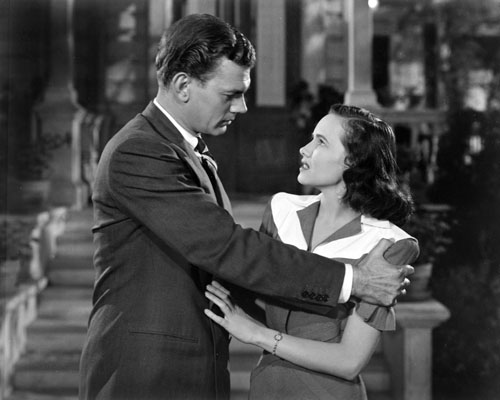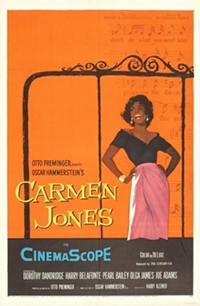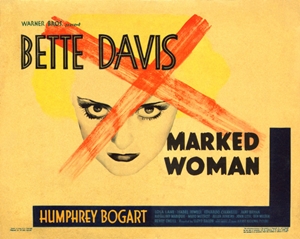By Michael Wilmington and Film Noir Blonde
A guide to classic film noir and neo-noir on cable TV. All the movies below are from the current schedule of Turner Classic Movies (TCM), which broadcasts them uncut and uninterrupted. The times are Eastern Standard and (Pacific Standard).
PICK OF THE WEEK
“Shadow of a Doubt” (1943, Alfred Hitchcock). Thursday, Oct. 4, 3:15 a.m. (12:15 a.m.)
A bright and beautiful small town girl named Charlotte “Charlie” Newton (Teresa Wright) is bored, bored with her well-ordered home in her pretty Norman Rockwellish little city of Santa Rosa, Calif., – where trees line the sunlit streets, everyone goes to church on Sunday, and lots of them read murder mysteries at night. Charlie has more exotic dreams. She adores her globe-trotting, urbane Uncle Charlie Oakley (Joseph Cotten) – for whom she was nicknamed – and is deliriously happy when he shows up in Santa Rosa for a visit.
But Uncle Charlie has some secrets that no one in his circle would guess – not Uncle Charlie’s adoring sister (Patricia Collinge), nor his good-hearted brother-in-law (Henry Travers), nor their mystery-loving neighbor Herbie (Hume Cronyn), nor Charlie herself. Uncle Charlie, who conceals a darker personality and profession beneath his charming persona, is on the run, pursued by a dogged police detective (Macdonald Carey), who suspects him of being a notorious serial killer who seduces rich old widows and kills them for their money. As handsome, cold-blooded Uncle Charlie, Cotten, who also called “Shadow” his personal favorite film, is, with Robert Walker and Anthony Perkins, one of the three great Hitchcockian psychopaths.
“Shadow of a Doubt,” released in 1943, was Hitchcock’s sixth American movie and the one he often described as his favorite. As he explained to François Truffaut, this was because he felt that his critical enemies, the “plausibles,” could have nothing to quibble about with “Shadow.” It was written by two superb chroniclers of Americana, Thornton Wilder (“Our Town”) and Sally Benson (“Meet Me in St. Louis”), along with Hitch’s constant collaborator, wife Alma Reville. The result is one of the supreme examples of Hitchcockian counterpoint: with a sunny, beguiling background against which dark terror erupts.
8 p.m. (5 p.m.): “The Fallen Idol” (1948, Carol Reed). In 1948, a year before they made the nonpareil thriller “The Third Man,” director Carol Reed and screenwriter Graham Greene collaborated on another tilted-camera film-noir classic: this mesmerizing story of a little French boy (Bobby Henrey), a French diplomat’s son, who hero-worships the embassy butler (Ralph Richardson), but mistakenly comes to believe his idol has murdered his wife, and keeps unintentionally incriminating him. With Michele Morgan, Jack Hawkins and Bernard Lee – and stunning cinematography by Georges Perinal.
Sunday, Sept. 30
12 p.m. (9 a.m.): “Carmen Jones” (1954, Otto Preminger). From Georges Bizet’s great, tuneful, massively popular opera, based on Prosper Merimee’s novel about a lusty cigarette girl and the soldier who is obsessed with her, unwisely: A compelling noir musical, with an African-American cast (headed by Dorothy Dandridge as femme fatale Carmen and Harry Belafonte as soldier Joe), lyrics and libretto by Oscar Hammerstein II, and direction by Otto Preminger. The rest of the cast includes Pearl Bailey, Diahann Carroll and Brock Peters.
2 p.m. (11 a. m.): “The Fortune Cookie” (1966, Billy Wilder). Billy Wilder, mastermind of that quintessential film noir “Double Indemnity,” comes up with another ingenious insurance swindle in this dark, very funny comedy noir. Jack Lemmon is Harry Hinkle, a likable pro- football TV cameraman who is run down before millions of spectators on a punt return. Walter Matthau won the Oscar playing Harry’s brother-in-law, a sneaky, cynical, loot-smelling lawyer.
Thursday, Oct. 4
1:30 a.m. (10:30 p.m.): “Marked Woman” (1937, Lloyd Bacon). Bette Davis plays a feisty “hostess” and Humphrey Bogart plays a crusading D. A. Together with Bette’s pals, other “hostesses” (aka ladies of the evening), they go up against the mob, in this feminist pre-noir crime classic, co-scripted by Robert Rossen. Based on a famous real-life New York City prostitution case. The Bogart and Eduardo Ciannelli characters are modeled on Thomas Dewey and Lucky Luciano. With Lola Lane, Allen Jenkins and Mayo Methot (Mrs. Bogart).













From FNB readers